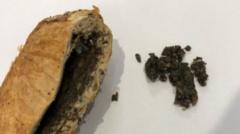In a case that captivated Australia and beyond, Erin Patterson was convicted of murdering three relatives through a toxic Beef Wellington meal. Evidence presented included CCTV footage, audio recordings, and findings of poisonous mushrooms, alongside attempts to conceal her actions.
Erin Patterson's Mushroom Murder Case: Guilty Verdict and Revealing Evidence Uncovered

Erin Patterson's Mushroom Murder Case: Guilty Verdict and Revealing Evidence Uncovered
Erin Patterson, an Australian woman, was found guilty of murdering three relatives with a toxic mushroom-laced meal, leading to widespread media attention and trial revelations.
In a case that has sent shockwaves across Australia, Erin Patterson, aged 50, was convicted by a jury of murdering three of her relatives using a Beef Wellington meal laced with toxic mushrooms. The court found her guilty not only of this heinous act but also of the attempted murder of a fourth individual who survived the grim meal on July 29, 2023.
Hailing from the small Victorian town of Morwell, Patterson was accused of sourcing death cap mushrooms from nearby locations, with the prosecution alleging that she then attempted to cover her tracks by disposing of evidence and providing misleading information to investigators. Tragically, three individuals – Patterson’s former in-laws, Don and Gail Patterson, both 70, and Gail’s sister, Heather Wilkinson, 66 – succumbed to mushroom poisoning shortly after consuming the meal. Meanwhile, Ian Wilkinson, Heather's husband, spent weeks recovering in the hospital.
In the wake of the trial, the Supreme Court of Victoria unveiled around 100 images presented as evidence, including photographs of the leftover Beef Wellington collected from Patterson's residence. These leftovers, stored in specimen bags for forensic examination, contained traces of death cap mushrooms, infamously known for being among the deadliest fungi in existence.
Patterson claimed she procured the mushrooms dried from an Asian grocery in Melbourne, although she could not recall specific details about her purchase. Investigators, however, uncovered evidence revealing that death cap mushrooms were reported in nearby towns before the incident, and Patterson's internet search history indicated visits to a plant identification website where such mushrooms were documented.
Technological evidence, including her mobile phone records, suggested that Patterson had traveled to these locations and even purchased a food dehydrator, which would later become crucial to the case. This appliance, which she previously denied owning, was found shortly after the incident—discarded at a local dump where traces of death cap mushrooms and her fingerprints were recovered.
Despite initially feeling ill, Patterson had expressed reluctance to admit herself and her children for medical treatment, with tests showing no signs of poisoning in her children. The conclusive findings of toxic mushrooms along with CCTV footage of her disposing of the dehydrator, painted a picture of guilt that led to the jury's decision. This case has not only highlighted the dangers of mushroom foraging but has also raised ethical questions surrounding deception and familial trust, sending ripples of intrigue through both legal and social discussions within the community.

















